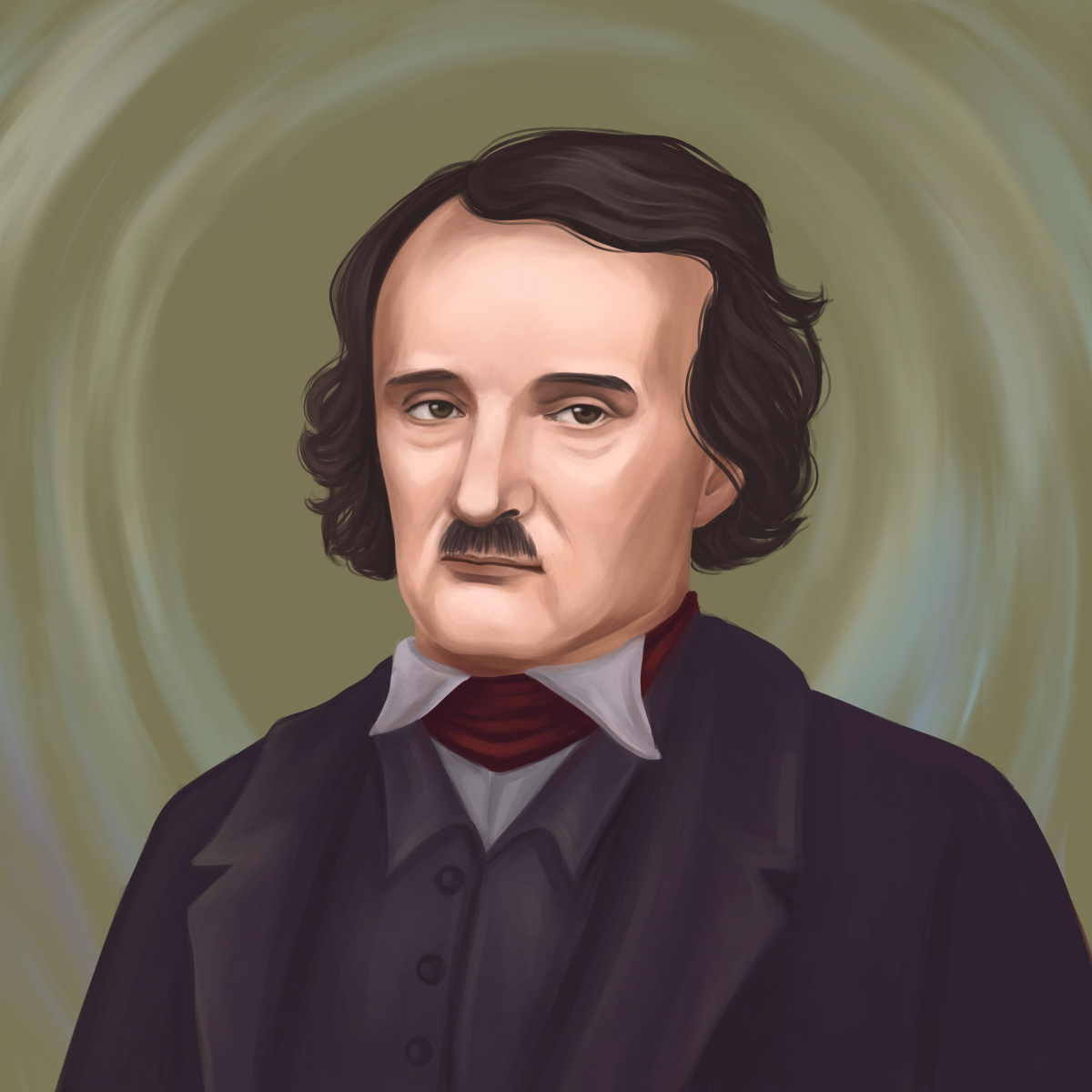Edgar Allan Poe’s work as a poet, short-story writer, and editor was notable in his contribution to world literature. Poe was a pioneer of mysterious, thrilling writing that left its mark on American poetry and literature forever. He is considered one of the originators of detective fiction and true gothic horror.
He was also one of the first American writers to gain an international reputation. His overall body of work, such as; poetry, short stories, tales of horror, and even critical theories, has garnered him a major figure in the history of literature.
Life Facts
- Edgar Allan Poe was born in Boston, Massachusetts, on January 19, 1809.
- Poe enlisted in the US Army at eighteen years old.
- Poe is credited with the invention of the detective genre of fiction.
- ‘Tales of the Grotesque and Arabesque‘ was published in 1839.
- Virginia, Poe’s young wife, died in 1847 from tuberculosis, and Edgar Allan Poe died two years later.
Interesting Facts
- He struggled with gambling debts.
- Poe married his thirteen-year-old cousin Virginia.
- He might’ve been named after a Shakespearean character in “King Lear.”
- ‘The Raven‘ was published in 1845.
- His death has remained a mystery, inspiring many to speculate on the cause.
Famous Poems
- ‘The Raven’ is one of the scariest poems that Poe wrote. It has since become his most famous and commonly studied. The phrase “Quoth the raven Nevermore” has been included in everything from Halloween decorations to horror movies/tv shows. The poem takes the reader into the mind of a questionable narrator who is experiencing what seems to be a mental break.
- ‘Anabel Lee’ is a gorgeous short poem that depicts, as many of Poe’s poems did, the death of a woman. Poe’s life was filled with tragedy, particularly around the women he loved. The poem describes the love the speaker had for a young woman who has since been taken away by the angels. Their jealousy got the best of them, and they brought her to Heaven.
- ‘Alone’ is another haunting poem that was inspired by the death of a woman in Poe’s life, this time his foster mother, Frances. In it, the speaker looks at his childhood and tries to understand his loneliness. The entire poem is quite dark and carries a depressing and downtrodden tone throughout.
- ‘The Haunted Palace’ originally appeared in Poe’s short story, The Fall of the House of Usher. The poem describes, through the metaphor of an old house, the collapse of a person’s mind. This person, who is represented by the house, is slowly but steadily going insane.
- ‘Lenore,’ which is also sometimes known as ‘A Pæan,’ is once more a description of the emotional results of a young woman’s death. In the poem, the speaker changes perspectives, alternating between different perspectives on Lenore and what everyone should do in regard to her death now.
Explore more Edgar Allan Poe poems here.
Early Life
Edgar Allan Poe was born in Boston, Massachusetts, on January 19, 1809. He was the second child of English actress Elizabeth Arnold Hopkins and his father, David Poe Jr, who was also an actor. It is often speculated that Poe was named in accordance with the Shakespearean play in which his parents were performing at the time of his birth. His family was both Irish and English by descent and came to America around 1750. He had two siblings, an older brother, William, and a young sister, Rosalie.
Poe’s father left his family in 1810, and unfortunately for the young children, their mother died a year later from tuberculosis, or consumption as it was commonly known. Poe was not yet three years old. From that point on, Poe was raised by a Scotsman named John Allan in Richmond, Virginia. It was from this family that Poe took on his middle name, “Allan.” For a short time, when Poe was still quite young, the family took a trip to Scotland. He studied at a grammar school in Irvine and later at a boarding school in Chelsea, England.
After a temporary stay in Great Britain, the family moved back to Richmond in 1820, and in 1826 Poe registered at the University of Virginia. It was his intention to study ancient and modern languages. Poe’s time at the university was turbulent, and due to increasing gambling debts, he lost touch with his foster father. He left university after only one year and traveled to Boston, where he worked as a newspaper writer and clerk. Poe’s funds and career prospects were quite limited, so in an effort to improve his circumstances, he enlisted in the US Army at eighteen years old.
Literary Career
He served at Fort Independence in Boston at the same time that he was releasing his first volume of poetry titled ‘Tamerlane and Other Poems.’ The book had very limited printing and received little to no attention. After two years in the army, Poe sought and was given a discharge, after which he moved back to Baltimore, where he stayed with his aunt Maria Clemm and her daughter Virginia Eliza Clemm. He was also publishing his second collection, this time, ‘Al Aaraaf, Tamerlane, and Minor Poems,’ which was released in 1829.
Due to the circumstances of his military discharge, he was made to attend the United States Military Academy at West Point. His time there was also brief, during which he sought out a court-martial for neglect of duty. He then moved on to New York City. The following years saw the release of his third volume of poetry and the death of his brother. In the mid-thirties, after meeting with no poetic success, Poe turned to prose. He won a prize for his work in 1833, bringing him a small amount of attention.
In 1835, Poe became the assistant editor of the Southern Literary Messenger, was fired for drunkenness, and married his thirteen-year-old cousin Virginia the next year. At their wedding ceremony, the couple was forced to lie about Virginia’s age, stating she was 21 instead of 13. In 1839, he was appointed coeditor for Burton’s Gentlemen’s Magazine in Philadelphia. Poe then regained his previous job and published a number of poems, stories, and reviews. It was during this time that he wrote some of his best-known stories such as, “The Fall of the House of Usher,” and “The Murders in the Rue Morgue,” which is considered to be the inception of the modern detective story. These works were part of the collection ‘Tales of the Grotesque and Arabesque’ published in 1839.
Writing Career and Relationships
Three years later, Poe’s temporary good fortune took a turn for the worse. Virginia began to show signs of consumption, symptoms Poe knew well. His drinking became worse during this time period, and he left his job. He worked for a couple of other journals, and his most popular poem, ‘The Raven,’ was published in 1845.
Poe’s wife died in 1847 from tuberculosis, causing a deepening of his depression and further worsening his alcoholism. After her death, he attempted to enter into a permanent relationship with another poet. The couple became engaged, only to split up, driven apart by Poe’s habits.
In 1849, Poe released a lecture called ‘Eureka,’ which has been met with mixed reviews to this day. Some scholars and critics viewed the work that explained the universe as a piece of genius, while others considered it nonsensical.
Death
Edgar Allan Poe’s death is still somewhat mysterious. He left Richmond for Baltimore in September 1849. On October 3, 1849, he was found wandering around Baltimore in a semi-conscious state. He was taken to the hospital very early in the morning but was never conscious long enough to explain his condition. It is said that he was wearing someone else’s clothes during the whole ordeal and called out for someone named “Reynolds.” He died four days later of what was then called “acute congestion of the brain.” It is now thought that he had perhaps suffered from rabies, syphilis, cholera, or perhaps heart disease.
Influence from other Poets
Edgar Allan Poe was notably influenced by writers such as Lord Byron, John Keats, Percy Bysshe Shelley. He has served as an inspiration for countless others since his death. It is said that the poems of Edgar Allan Poe heavily influenced the French Symbolist movement of the late 19th century.
FAQs
Edgar Allan Poe has been attributed to many iconic quotes. However, one that stands out is his view on language when he says that “Words have no power to impress the mind without the exquisite horror of their reality.”
Edgar Allan Poe was lauded for his wide range of talents, from short story writing to essays on critical theory. However, his poetry was iconic. His most famous work is ‘The Raven,’ a poem about the narrator’s descent into madness.
Like with any creative person, their life filters through into their work. This was no different for Edgar Allan Poe. After the death of both his parents at a young age and then witnessing the death of his foster mother, it is clear to see the correlation between Poe’s fascination with the macabre and his own life circumstances.
Alongside being a pioneer in his poetic field, Edgar Allan Poe was responsible for creating a number of new words that had not been seen in print before. It is believed that he had a hand in the birth of around 1200 words.
Although we can never know a poet’s true inspiration, it can be argued that Edgar Allan Poe’s life experiences shaped his poetic style. He had suffered many losses throughout his life and had been surrounded by death at every stage. As life imitates art, it is safe to assume that these morbid experiences had an impact on Poe’s work.


